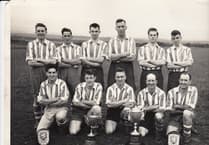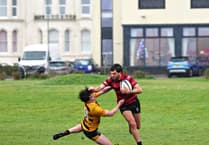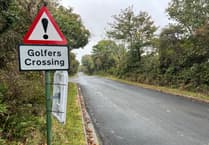While competitive golf remains on the backburner at the moment, Ramsey Golf Club correspondent Richard Power has delved into the history books to remember VE Day.
A week or so after being allowed back onto our beloved golf courses, Ramsey GC has enjoyed a dawn to dusk procession of mostly single golfers easing themselves back into the groove in near-perfect conditions.
The system of playing in Ramsey has been adhered to with great success in the knowledge that patience will reward the golfer as playing restrictions are reviewed.
Friday brought us a time to celebrate and reflect upon Victory in Europe in 1945, a high cost for the democracy and freedom we take as ’normal’. Of course, VE was a time of great celebration but the war years had been unimaginably tough on everyone.
Golf clubs also suffered. Ramsey’s youth had gone to serve in the war, golf income dwindled and the course was all but closed to help with the agricultural effort. Members gave their time to try and maintain the course but paying the ground rent became nigh on impossible.
The question of raising subs to maintain the course was never off the agenda, a familiar story to all I am sure. Following an appeal to the town to support the club, funds were raised which just about secured the club through the war.
In remembering the fallen, I am indebted to Robbie Radcliffe, author of the definitive history of Ramsey Golf Club ’Course of Time’. He recounts an interesting story of the 1939 Ramsey Town Cup and its winner Robert Morison Cumming.
Robert was the son of Howard and Eileen Cumming from Cookham, Berkshire and a member of the club on his summer break from university.
He was a 19-year-old winner of one of the more controversial tournaments in the 119-year history of the Ramsey Town Cup. Nothing untoward about his victory, he won fair and square by three shots with a nett 135 for the two rounds.
But during the latter part of the first round and the start of the second, there was a torrential downpour causing a large number of the players to take shelter, delaying the start of the final 18 holes.
So bad had the rain been that cancellation was considered. A course inspection by the professional deemed it playable even though two players had returned to the clubhouse to report the second green was completely underwater!
Following close of play the committee, after lengthy deliberations, bravely disqualified two-thirds of the 62 starters for breaching the rules of golf over ’undue delay’. Sadly, Robert did not get to defend his trophy which would not be held again until 1947.
Following the outbreak of war, Cumming joined the RAF Volunteer Reserve as a flying officer pilot and he was posted to 103 Squadron at RAF Elsham Wolds, north Lincolnshire on October 28, 1942.
His Avro Lancaster Bomber W4339 and crew of six flew a successful sortie over Stuttgart on November 22 and over Turin six days later.
On December 2, 1942 he was fatefully reunited with the Lancaster W4339 for a raid over Frankfurt but things didn’t work out.
The 103 Squadron had detailed 14 aircraft for this attack, part of a 112-strong Bomber Command force consisting of 48 Halifax, 27 Lancasters, 22 Stirlings and 15 Wellington aircraft.
They left the airfield at 1.27am that night. As far as bombing Frankfurt was concerned, the mission was a failure. The pathfinders were unable to sight due to a thick haze covering Frankfurt.
Consequently, most of the bombing was from heights of between 5,000ft and 14,000ft and the payload fell in country areas southwest of the city, probably misdirected by decoy fire sites operating in the area.
Approaching their target, the group was attacked by Luftwaffe Ju88s and hit by moderate to heavy searchlight directed anti-aircraft flak. The last contact with Robert Cumming was at 5.05am on December 3 southeast of Astheim.
The Lancaster had sustained flak damage and crashed between Trebur and Gross Gerau, Hessen five miles south of Russelheim, killing all. Robert was only 21 and the youngest crewman, the observer, was only 18.
Losses that night were three Halifax, one Wellington, one Stirling and the Lancaster containing Robert Cumming. The 103rd Squadron Volunteer Reserve and his fellow crew members are buried in the Durnbach War Cemetery in Bayern, Germany amongst 2,878 other fallen heroes.
To them and others, we owe.
RICHARD POWER





Comments
This article has no comments yet. Be the first to leave a comment.